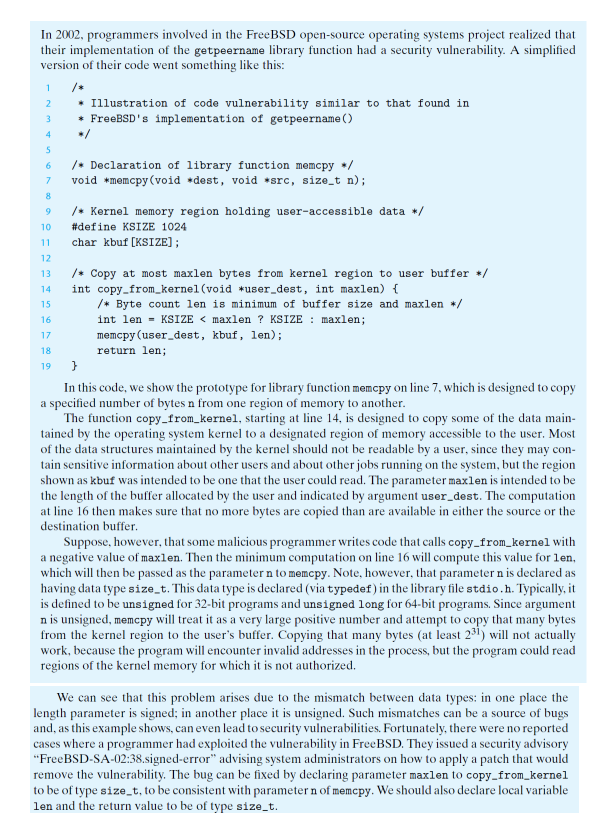[3] Read about this security vulnerability issue and write one short paragraph of summary/share your thought.

In 2002, programmers involved in the FreeBSD open-source operating systems project realized that their implementation of the getpeername library function had a security vulnerability. A simplified version of their code went something like this: In this code, we show the prototype for library function memcpy on line 7 , which is designed to copy a specified number of bytes n from one region of memory to another. The function copy_from_kernel, starting at line 14 , is designed to copy some of the data maintained by the operating system kernel to a designated region of memory accessible to the user. Most of the data structures maintained by the kernel should not be readable by a user, since they may contain sensitive information about other users and about other jobs running on the system, but the region shown as kbuf was intended to be one that the user could read. The parameter maxlen is intended to be the length of the buffer allocated by the user and indicated by argument user_dest. The computation at line 16 then makes sure that no more bytes are copied than are available in either the source or the destination buffer. Suppose, however, that some malicious programmer writes code that calls copy_from_kernel with a negative value of maxlen. Then the minimum computation on line 16 will compute this value for len, which will then be passed as the parameter n to memcpy. Note, however, that parameter n is declared as having data type size_t. This data type is declared (via typedef) in the library file stdio.h. Typically, it is defined to be unsigned for 32 -bit programs and unsigned long for 64-bit programs. Since argument n is unsigned, memcpy will treat it as a very large positive number and attempt to copy that many bytes from the kernel region to the user's buffer. Copying that many bytes (at least 231 ) will not actually work, because the program will encounter invalid addresses in the process, but the program could read regions of the kernel memory for which it is not authorized. We can see that this problem arises due to the mismatch between data types: in one place the length parameter is signed; in another place it is unsigned. Such mismatches can be a source of bugs and, as this example shows, can even lead to security vulnerabilities. Fortunately, there were no reported cases where a programmer had exploited the vulnerability in FreeBSD. They issued a security advisory "FreeBSD-SA-02:38.signed-error" advising system administrators on how to apply a patch that would remove the vulnerability. The bug can be fixed by declaring parameter maxlen to copy_from_kernel to be of type size_t, to be consistent with parameter n of memcpy. We should also declare local variable len and the return value to be of type size_t







